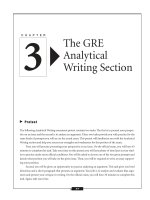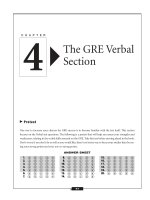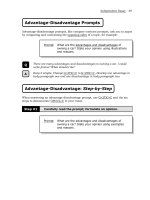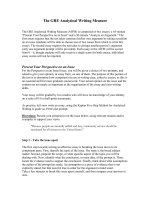Acing the gre 7 docx
Bạn đang xem bản rút gọn của tài liệu. Xem và tải ngay bản đầy đủ của tài liệu tại đây (79.71 KB, 6 trang )
Study Strategies
You may be tempted to skip ahead to Chapter 3 to dive into the practice sections. Don’t do it
—
the study
strategies explained in this section are absolutely necessary to understand prior to moving ahead.
The Right Tools
You have this book, which will give you a solid foundation of knowledge about the GRE. You may also want
to use GRE Practicing to Take the General Test, the best source for retired GRE questions. You will also want
to assemble some other study tools and dedicate them to your GRE preparations, such as:
■
a good dictionary, such as Merriam-Webster’s Collegiate Dictionary, 11th Edition
■
a notebook or legal pad dedicated to your GRE work
■
pencils (and a pencil sharpener) or pens
■
one or more colors of highlighter
■
index or other note cards
■
paper clips or sticky note pads for marking pages
■
a calendar or personal digital assistant (PDA)
Have fun selecting your tools. Buy the type of pens you like the most. Select your favorite colors. You want
to look forward to your time with these materials. They can be a little reward for doing your work. Even the
feel of a special pen in your hand will give you a motivational boost when you sit down to work.
Information Gathering
You are already working on this step. Remember that the GRE is given throughout the year, not only on a few
test dates. You can go online to www.GRE.org to obtain a copy of the official GRE Registration Bulletin.You
can look at the Bulletin online or order a copy. In the Bulletin, you will find answers to the following questions:
■
Where can I take the GRE?
■
How do I register?
■
When should I register?
■
How much does it cost?
■
What do I need to bring with me to the exam?
■
What kinds of questions are on the GRE?
You already know a bit about the kinds of questions on the GRE. Subsequent sections of this book will dis-
cuss these questions in detail and offer study tips and strategies for answering them correctly.Answers to the
other questions come from the official GRE Registration Bulletin and from the testing centers listed in the Bul-
letin. Seek out that information right away—you will need it as you set up your study plan.
– STUDYING FOR THE GRE–
20
The Study Plan
You have thought about how, when, and where you will study. You have collected your tools and gathered
essential information. Now, you are ready to flesh out your study plan. Here are the steps:
1. If you have not done so already, take a practice test. You can use the questions in Chapters 3, 4, and 5 of
this book or take one or more of the tests in GRE: Practicing to Take the General Test. To create an effec-
tive study plan, you need a good sense of exactly what to study.
2. Analyze your test results. No matter what your results are, don’t worry about them. You are committing to this
study plan because you are going to improve your score. Fear and worry are your enemies here; let go of
them. Just look at each question as you score it. Why did you answer that question correctly? Did you know
the answer or were you guessing? Why did you miss that question? Was there something you needed to know
that you didn’t know? If so, what was it? Make a list of the things you need to know and how many questions
you missed because you did not know them. Think of how your score will improve as you learn these things.
Did you misunderstand any of the questions? This is actually a common problem with the reading
comprehension portion of the GRE Verbal test. The test makers at ETS write complex, grammatically
precise questions. The language and style can seem difficult and unfamiliar. It is easy to be confused,
and if you don’t understand a question, your chances of answering correctly aren’t good. The good
news is that, with practice, you will become much better at understanding these kinds of questions. If
misreading was the reason you missed some of the questions, that’s actually a good thing. Your prepa-
ration time is going to start paying off right away.
Did you make a careless mistake on any of the questions? Careless mistakes include marking the
wrong bubble and simply misreading or mistaking one word or number for another. If you are making
careless mistakes, you need to work on focusing. Again, this gets easier with practice.
3. Make a list of your strengths and weaknesses. This will point you in the right direction. Use your analy-
sis of why you missed the questions you missed. Now you know what specific math, verbal, and logic
skills you need to work on, and you know what test-taking skills you need to improve. Don’t forget to
congratulate yourself for the things you did well.
4. Determine your time frame. Decide how much time you can devote each day and each week to your GRE
preparations. Use the chart you filled out previously. How many weeks are there until the test? Be realistic
about how much time you have available—life will go on, with all its other demands—but don’t forget to
note when you have a few extra minutes. You will learn how to make good use of small windows of opportu-
nity. Once you know how much time you have, estimate how long you need to work on each specific task
you have set for yourself. You may find it useful to break down the Verbal section by question type
(antonyms, analogies, sentence completions, critical reading) and the Quantitative section by subjects (arith-
metic, geometry, algebra, and data analysis). You may have to prioritize your work in various areas, depend-
ing on the amount of time you have to prepare and the areas in which you can most improve your score.
5. Prioritize your study plan. “Learn everything by April 1” is not a useful plan. The first priority on your study
plan should be to thoroughly review this book so you can absorb the study tips and strategies for the exam.
“Know your enemy” is the first and most important strategy in warfare, and in this case, your testing weak-
nesses are your enemies. Studying and strategizing are your weapons to defeat them.
– STUDYING FOR THE GRE–
21
Spending a few days, or even a week or two, going through this book will help you determine your
study plans. For instance, you will learn in the Verbal section that a good vocabulary is one of your
most important assets on the GRE. You may decide that spending twenty minutes every day with a
copy of LearningExpress’s Vocabulary and Spelling Success in 20 Minutes a Day is a top priority for you.
(By the way, don’t worry about spelling for the GRE; the vocabulary is crucial.)
Let’s say, for example, you have seven weeks until your test date. The following table shows one way
you could set up your study schedule.
WEEK STUDY SCHEDULE
Week One Learn about and practice antonyms and analogies. Work on vocabulary.
Week Two Learn about and practice critical reading and sentence completion questions. Work
on vocabulary!
Week Three Review Analytical Writing topics (go to www.GRE.org/pracmats.html), and practice
writing essays.
Week Four Practice Analytical Writing essays.
Week Five Review sample Quantitative test questions. Find the kinds of questions you miss,
determine which skills and processes you need to study, and practice.
Week Six Continue Quantitative review and practice.
Week Seven Review any question types you don’t understand. Practice Analytical Writing. Get
lots of rest!
Naturally, if you have longer than seven weeks to prepare, your weekly schedule will be divided dif-
ferently. (And good for you, for starting ahead of time!) You may want to work on all your skills each
week, making progress simultaneously on all fronts. That’s fine, too. Adjust the schedule accordingly.
Your schedule will also be different if you have less than seven weeks, or if you are a whiz with num-
bers but have trouble with analytical writing.
6. Just Do It! Stick to your plan: It’s easy to say but hard to do. How can you stay motivated? How do you
follow your schedule so that you don’t fall behind? How do you keep from thinking about other things
when you are supposed to be working? These are really big questions, and there are no easy answers.
The next section presents some tried-and-true techniques for self-motivation. See what works for you.
– STUDYING FOR THE GRE–
22
1. Take a practice test.
2. Analyze your results.
3. List your strengths and weaknesses.
4. Determine your time frame.
5. Prioritize your study plan.
6. Study!
Six Steps to Successful Studying
23
You Are Worth It: Motivational Techniques That Work
Whenever you find yourself tempted to give up your hard work for an hour or two of entertainment, remind
yourself that many people never reach their goals because they seem so far away and difficult to achieve. It is
important that you break down your GRE preparation into small, manageable steps. It’s also important to
keep in mind why you are working so hard.
Remember your visualization about graduate school? The more often you practice that visualization,
the more real it becomes to you. The more real it is, the more clearly you will see that your goal is within your
grasp. Just stick to your plan: one day at a time.
Sometimes, your study plans are derailed for legitimate reasons: You get sick; a family member needs
your help; your teacher or boss assigns a project that takes more time than you expected. Life happens. Don’t
let it discourage you. Just pick up where you left off. Maybe you can squeeze in a little extra study time later.
Keep working toward your goal.
Break It Down
Many individuals get discouraged when the task seems too big. It seems they will never get to the end. That’s
why it’s a good idea to break down all big undertakings, like this one, into smaller, manageable bits. Set small
goals for yourself. For example, “This week, I will work on mastering analogies.”“Mastering analogies” is a
much more manageable task than “preparing for the GRE.” Establish positive momentum and maintain it,
one step at a time. That’s how you get where you want to go.
You Deserve It
Don’t forget to reward yourself for your progress. Your daily reward can be a small one. “When I finish this
chapter, I’ll make myself some lemonade.” Your weekly reward might be more grand. “If I keep to my study
plan every day this week, I’ll buy that CD I want.” Your big reward, of course, is being able to live out your
dreams, the ones in your visualization.
You Are Not Alone
Another way to motivate yourself is to get other people to help you. Everybody likes being asked for help—it
makes them feel important, especially when they are being approached for their expertise in a particular area.
Motivation Technique
We all need positive feedback. When you could use some motivational help, say the following out loud:
■ My goal is to (be specific) .
■ I am working to achieve my goal.
■ I will succeed because I am working toward my goal.
24
You may want to form a study group with one or more of your friends. Maybe analogies just come nat-
urally to you, but you struggle with algebra. Chances are you have a friend who is a math whiz but who may
need help with writing strategies. You could agree to get together once a week or so for a tutoring and drilling
session. You take one subject to study and explain, and your friend explains a different subject to you. Now
you are (a) benefiting from your friend’s expertise, (b) consolidating what you know by explaining it to some-
one else, (c) having more fun than you would on your own, and (d) helping yourself (and your friend) stay
motivated to study.
Maybe a family member or a roommate could help you, too. If you are working on vocabulary, why not
make up some flashcards with tough vocabulary and ask someone to quiz you?
Thought Police
Finally, as you struggle to stay motivated, it helps to check in periodically with your thoughts—the things you
sometimes find yourself thinking when you should be focusing on your work. A good time to check your
thoughts is when the time comes to study. If you are thinking, “Oh boy, I’ll have that last piece of chocolate
when I finish this!” or “Yale has never seen an art history student like me,” you are in good shape. If you are
thinking, “That TV show I really like is on now” or “I could get in a few hoops before dark,” you could be in
trouble. It’s not that there’s anything wrong with television or basketball; it’s just that you promised yourself
you would work right now. Often, just noticing those deviant thoughts is enough to keep them in check.
“Good try,” you think to yourself,“but you have other commitments!” If you are still tempted to blow a hole
in your schedule, sit down and think for a moment about why you are working so hard. Use your visualiza-
tion. Promise yourself a bigger reward when you finish your work. You can do it because you want to do it.
This is the person you want to be—disciplined, focused, and successful.
Finally, you may need to “trick”yourself into a study mode. Start with something easy, such as,“I’ll just
do a few flash cards.” Often, starting with a quick and easy task will ease you into the work and motivate you
to continue with your self-assigned task of the day.
Take Care of Yourself
You may have noticed that the last thing on the sample weekly chart is “get lots of rest.” During the last few
days before the exam, you should ease up on your study schedule. The natural tendency is to cram. Maybe
that strategy has worked for you with other exams, but it’s not a good idea with the GRE. First, the GRE Gen-
eral Test is basically a three-hour test (think marathon!), and you need to be well rested to do your best. Sec-
ond, cramming tends to raise your anxiety level, and your brain doesn’t do its best work when you are anx-
ious. Anxiety produces a fight-or-flight response that sends blood away from the brain to the arms and legs,
in case we need to defend ourselves or run away. Without a good supply of oxygen-carrying blood, your brain
won’t be able to think as well as it can. So it is important to reduce your anxiety about the GRE by relaxing
and changing your anxious attitude to one of calm self-assurance.
How to Relax
If you want to do productive work the night before the GRE, spend the time working on your confidence
(“I’ve worked hard and will do well”). Visualize your graduate environment—really see yourself there. Here
are some other relaxation techniques you can use if you find yourself getting anxious at any time before or
during the GRE.
1. Breathe. When most people think about breathing, they think about breathing in. The fact is, when
you want to relax, it’s more important to focus on breathing out. You want to be sure you are exhaling
completely. It’s also important to breathe deeply and to use abdominal breathing rather than shallow
chest breathing. Try this: Place one hand on your stomach and the other hand on your chest. Sit up
straight. Now, inhale deeply through your nose. Try to move your stomach as much as possible and
your chest as little as possible. Exhale, and feel your stomach deflate. Again, your chest should hardly
move. Count slowly as you breathe to make sure you spend at least as much time breathing out as you
do breathing in. This kind of breathing relaxes you. It gets rid of carbon dioxide that can otherwise get
trapped in the bottom of your lungs. You can practice this deep breathing anytime, anywhere you need
to relax.
2. Tense and relax your muscles. As your anxiety mounts, your muscles tense, just in case they are going to
be called on to fight or flee. Of course, in the case of the GRE, you have to fight with your brain
because running away would result in a very low score. So the best thing you can do is to relax. It can
be hard to know which muscles are tensed. Many people hold tension in their shoulders or their jaws,
and are never even aware it’s there. It’s helpful to start with your toes and work your way up through
all the muscle groups, first tensing (really tightly!) and then relaxing each group. (Tense your toes, and
relax. Tense your feet, and relax. Tense your calves, and relax ) Don’t forget your facial muscles,
especially your jaw.
3. Visualize! This is a different exercise from your graduate school visualization. In this one, you imagine
yourself in a favorite place, a place you find especially soothing and pleasant. It could be a real place or
one found only in your imagination. Focus on the sensations of your special place—what does it feel
like, look like, sound like? You want to feel like you are really there. Take a few minutes to just relax in
this place. It’s there for you any time you need it, and it will always help you be calm and focused.
– STUDYING FOR THE GRE–
25









